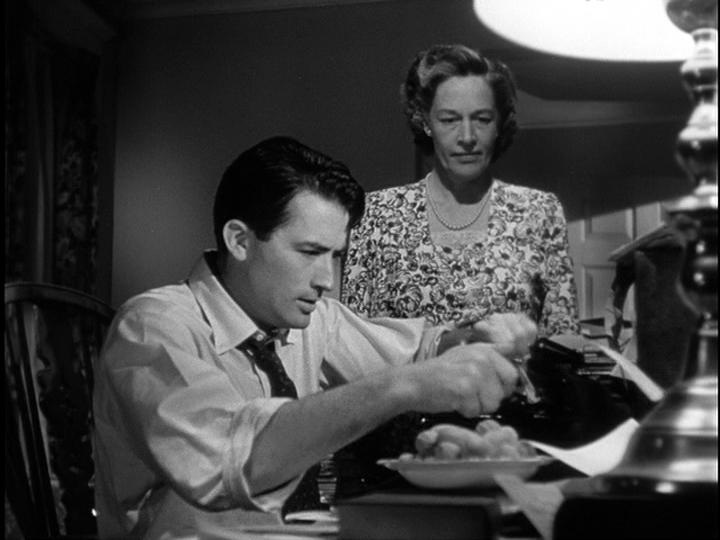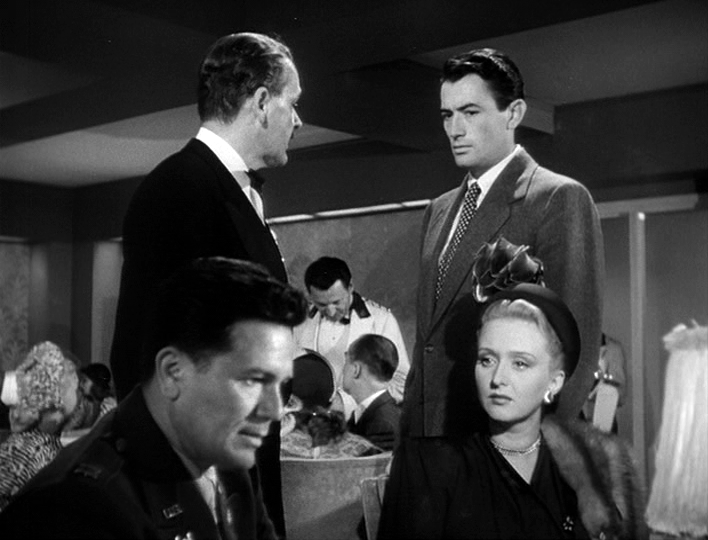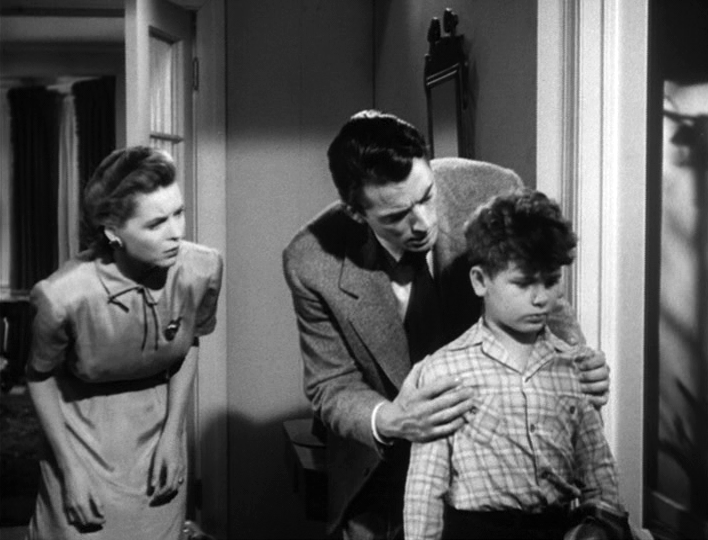Gentleman’s Agreement, 1947, Twentieth Century Fox. Starring Gregory Peck, Dorothy McGuire, John Garfield. Directed by Elia Kazan. B&W, 118 minutes.
Philip Schuyler Green (Gregory Peck) has moved with his mother (Anne Revere) and ten-year-old son Tom (Dean Stockwell) to New York to take on a new job as a magazine reporter. When he’s given an assignment on anti-semitism, his editor confidently tells him his particular skills will give the topic a strength it hasn’t had in the hands of lesser writers.
He struggles with the idea, uncertain at first if he even wants to tackle it. However, a few searching questions from his son and some dry observations from his mother change his mind. Trying to find a fresh, workable angle is proving impossible. Then Phil, who is not Jewish, hits on the idea of living as a Jew in New York City for however long it takes to get the story he needs.

Gregory Peck, Anne Revere
He’s met and fallen in love with Kathy Lacey (Dorothy McGuire), a seemingly liberal woman whose deeply ingrained prejudices start to show as he begins to face the realities of bigotry. She is among a handful of people who know his real identity, and she’s careful to make sure the right people also know that truth.
Added to the mix is Phil’s childhood friend Dave Goldman (John Garfield), who’s just moved to New York after serving in the war. Dave, of course, knows the truth about Phil’s heritage. As a Jew, he lends insight to the research.
The film won three Academy Awards: Best Picture, Best Director, and Best Supporting Actress (Celeste Holm, as the magazine’s fashion editor and Phil’s confidante). It was nominated for five others, including Best Actor (Peck) and Best Actress (McGuire).

John Garfield, Gregory Peck, Celeste Holm
John Garfield, who was Jewish, generally played leading men, but accepted the supporting role because he believed in the importance of the film. The part of Phil’s son, Tommy, was played by Dean Stockwell, the veteran actor with one of the longest careers in Hollywood.
Gentleman’s Agreement was made in the years immediately following the Holocaust, when Americans were learning increasing amounts about the persecution of Jews and becoming sensitive to bigotry in their own country. Filmmakers, too, after the horrors of World War II, began to focus on more serious issues. They took on “real” topics, such as alcoholism in The Lost Weekend and the trials facing returning veterans in The Best Years of Our Lives. Audiences responded well.
Interestingly, however, the film never mentions the Holocaust, a deliberate decision on the part of the film’s producer and director. Another point of interest is the use of racial slurs; words that are considered on par with profanity today were used in the movie without reservation and any apparent objection by censors.

Dorothy McGuire, Gregory Peck, Dean Stockwell
The movie is still noteworthy for its ability to bring forth intelligent discussion of anti-semitism. Critics note that it focuses on only one region in the country, that is, the upper-crust society in which Philip Green lives. Whether or not that is a fault of the film is debatable. This is one movie’s take on the topic, and it can’t be responsible for portraying the whole of the problem.
Gentleman’s Agreement is complex, as is its topic, well-acted and thought-provoking. It remains a worthwhile movie for anyone interested in what a film can do for shining light society’s ills, as well as those who enjoy classic movies at their best.

I quite like this one. It unfolds like a good play — dialogue & characters take center stage. And I thought McGuire did a fantastic job in a rather difficult role. She conveys beautifully the idea that prejudiced attitudes are not limited to abrasive racists.
LikeLiked by 1 person
I found it to be thoughtfully done, and I agree, McGuire did a beautiful job with a challenging role. It raises the issue of when and where bigotry starts.
LikeLiked by 1 person
Netflix! I have that. Thank you, Belinda. Peck and Garfield–two strong actors, for sure.
LikeLiked by 1 person
Garfield is really good in this film, as well — of course he typically was a leading man, so perhaps you can expect a little more!
LikeLiked by 1 person
A great film with themes that are relevant even today!
LikeLiked by 1 person
[…] for Edmund Gwenn and Best Writing, Screenplay. It was also nominated for Best Picture, losing to Gentleman’s Agreement, another fine film that […]
LikeLike
Perfect review of a brave film for its time, one that was conveying a critical message to society.
The film is deeply thoughtful and quite verbose, (and though its been a while since I’ve rewatched it) I do feel it was somewhat ‘instructive’, as if it’s taking the 1948 audience through a full 12-step program – – which the audience did in fact need by the way.
Seventy years later, discrimination and inequality have not been wholly obliterated from the face of the earth, but we do know a lot better than to tolerate casual racial slur words and blurred lines of bigotry (as if we were bystanders to covert abuse).
This makes it painful for us to look back on such micro-moments in so many movies that are more than 40-50 years old. Even the ‘N’ word is used freely in revolutionary films like To Kill a Mockingbird and The Heat of the Night.
Belinda, I clicked onto this review because well I’m mad about Gregory Peck (and I love that he made bold choices back in his day including films like Gentleman’s Agreement and I was glad to see that you reviewed another of his films).
But reading your review made me think of a completely different movie – – one that I just watched this week. It’s the Disney remake of The Lady and the Tramp. It’s a lovely film, family friendly with all those adorable doggies.
The film is set in the 1910-era in a thriving city along the Mississippi, and its cast is fully ethnically-diverse.
Reading your review and thinking back to Gentlemen’s Agreement, it occurred to me that this adorable remake ‘felt’ just as ‘instructive’ to the audience – – be it about how things ‘should be’ or about how things ‘should have been’.
. . . well there are whole dissertations written each year on the ‘role’ of mainstream cinema in forming social consciousness and the pros and cons therein. Meanwhile, I give both films ‘thumbs up’ for their ‘instructive’ effort.
LikeLiked by 1 person
As always Sunny, thank you for your thoughtful comments. I appreciate everything you have to say. Now I’ll have to watch the remake of “Lady and the Tramp”!
LikeLike
LOL yeah for sure it’s really adorable, and dare I admit to liking the live-action remake a tad more than the original. Generally, I’m enjoying the Disney ‘reboots’. Aladdin was a hoot with Will Smith excellent portrayal of the Genie. He did not mimic Robin Williams in any way, rather he pulled out his old Fresh Prince persona, which is what had endeared him to stargazers in the first place. And I also really enjoyed the new Mulan and Beauty and the Beast.
I should have mentioned the other day, Roman Holiday is not even my favourite of either Audrey or Greg’s films. I’ve seen about a dozen of Audrey’s films and about fifty of Greg’s (many of which I’m crazy about).
Stay very safe Belinda. I hope things are as well as can be in your region. Though actual numbers are still climbing, the stats are showing slight downward trends.
For 5-6 weeks now, I’ve been wearing mask & gloves when doing errands. The stores in my area disinfect hands-gloves upon both entry & exit. And ofcourse I do a good soapy wash when I arrive in the house.
My heart goes out to workers in those sectors who will not see recovery in the near future – – notably airlines, hotels, restaurants and many small shops.
LikeLiked by 1 person
You stay safe, too. It sounds like you’re doing what you can. My heart also goes out to all those people out of work who may not get to go back anytime soon.
LikeLike
P.S. I haven’t seen Aladdin yet, but I have friends who did who were chuckling days after watching it.
LikeLike